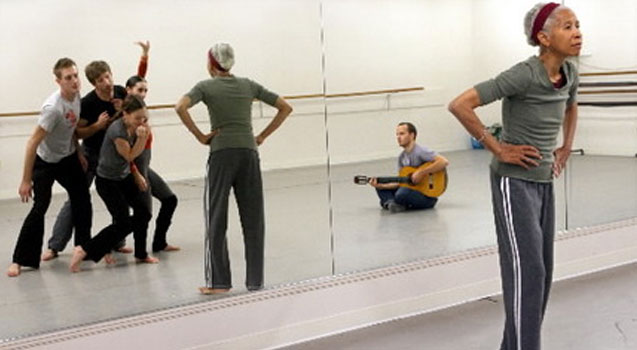A generous array of life lessons can be glimpsed in “Just Yesterday,” the new Dianne McIntyre work that GroundWorks DanceTheater introduced over the weekend at the Breen Center for the Performing Arts.
The Cleveland choreographer crafted this endearing and potent piece after interviewing the GroundWorks dancers about their families. A sort of memory dance, “Just Yesterday” gives equal voice to each of the cast members as tales they experienced or heard decades after the fact are related. McIntyre’s seamless weave of events abounds in communal joy, ethnic pride and touching details, as well as sober remembrances.
Along with whimsical and loving anecdotes involving motorcycles (Felise Bagley), sticky candy thrown at a movie screen (Sarah Perrett) and adored grandparents (Amy Miller), there is a youthful visit to a slaughterhouse (Damien Highfield), an account of racial acceptance (Kelly Brunk) and a harrowing depiction of Japanese immigrants sent to a Canadian relocation center during World War II (artistic director David Shimotakahara).
The beauty of “Just Yesterday” lies in its keen balance of moods. Set to a disarming and atmospheric collection of folk, blues and jazz numbers by Olu Dara (and played onstage to the hilt by guitarists Phillip Smith and Dan Wilson), the work is suffused with feelings while avoiding the temptation to go over the nostalgic cliff. Each vignette makes its presence known – one rooted in favorite foods is hilarious – and then steps aside to allow the next sequence to have its antic or eloquent say.
McIntyre’s choreography reveals her ability to convey emotions in a cavalcade of flowing and exuberant gestures. In addition to movement that challenges their physical gifts, the dancers speak (not always with optimum clarity at Breen) and sing (the equivalent of warbling in the shower).
At Saturday’s performance, the cast appeared to exult in the connections both to their actual families and to colleagues who have become artistic kin. With its fine blend of agility and truth, “Just Yesterday” is an affecting reminder for the need to nurture strong bonds.
The Cleveland modern dance company presented works of striking abstraction to precede the world premiere. Shimotakahara’s “Polarity” takes up the subject of kinetic opposition with dancers, dressed in orange attire, bobbing and stretching in robotic counterpoint.
A string of neon lights divides the stage floor, sometimes lit in sections as the dancers perform solos or duets and hop from upstage to down. Brunk was tireless in a series of complex repeated phrases, and he and his GroundWorks peers danced with lithe elegance to Gustavo Aguilar’s musical mélange of electronics, radio chatter and static.
The full company applied bountiful resilience to Zvi Gotheiner’s “Delayed,” in which the dancers face the audience and revel in individual quirks, interrupted couplings and unison patterns. Terry Riley’s mesmeric “Poppy Nogood and the Phantom Band” provided the sonic impetus for the GroundWorks dancers to do their typically dynamic thing.
By Donald Rosenberg
The Plain Dealer
January 24, 2010
Photo by Lynn Ischay


